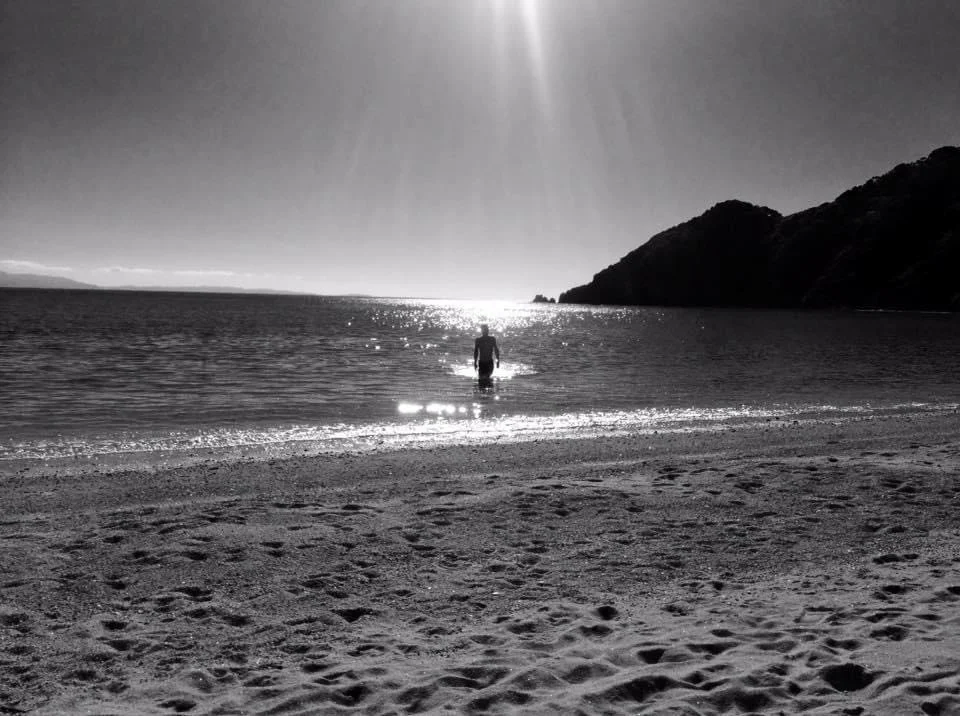Blue. Mother. Orange. Go.
By Talia Marshall
Isaac, always drifting, takes a wrong turn and gets stuck wandering around the shopping village at Kaiapoi. An older couple see him, this furtive waif, and offer to give him a ride as far as Culverden.
The woman has a greying braid under a white scarf tied at the back of her neck and she turns to talk to Isaac often. The waggly skin tag near her ear distracts him with wanting to pull it off. She tells Isaac her name is Eleanor, and the man is Matthew, and goes into some spare detail about their small farm. Matthew is silent except for his nod and drives staring ahead at the straight road which begins to bend into the jutting stony outcrops.
God loves you Isaac, Eleanor says, as they drop him off by the side of the road to hitch to his new job thinning pines further north. Sometimes Isaac doesn’t even need to stick out his thumb before a man slows to give him a ride. Eleanor has been slightly harder work. Isaac had to look lost rather than found.
A week later Isaac is staying at a holiday park in Blenheim with the rest of the forestry gang when a package arrives for him. It is from Matthew and Eleanor and contains good work socks, a khaki jacket, a bible and some DVDs they tell Isaac to watch in the letter. Eleanor writes that they love Isaac like God loves him, and if things stay rough for him, if it gets too hard, he can come and stay. Isaac will be able to work on the farm, all their children have left home. He would be helping them.
They name Isaac on their account at the local Farmlands store and he buys a pair of expensive hiking boots that make him almost three inches taller as he walks out of there and away from the staff’s suspicious looks.
But Isaac has a habit of throwing things away, even stuff he loves, so he chucks out their bible and the DVDs into the communal kitchen bin without a thought in his head apart from scoring. He is only superstitious about Māori things as much as he transgresses this system too because he is hapless. The boys laugh at the letter he reads out to them as they pass the glass pipe. We love you Isaac they parrot.
When Isaac tells me about the couple I wonder if they are refugees from a cult, and a man writing me letters tells me about the Camp David Kingdom near Waipara, another strange and uncool sect which contributed to cults becoming synonymous with sexual abuse. I wonder how long Isaac would last in any cult, given his history of being passed through the sticky hands of adults. Isaac calls the couple the Gloriavale people to me when he rings but they seem even weirder than that.
The forestry gang move on to the West Coast and Isaac gets caught stealing some pounamu in Hokitika, from a factory shop where you can make your own pendant and he gaps it, leaving the motel room in Ross in a state. The woman who runs the place tut tuts at the cigarette butts she finds under the bed. She was initially soft on him, even the meth smile breaking the perfection of his pale Māori face.
When she interrogates the rest of the boys, they say they have no idea where Isaac has gone or who will pay his bill here at the motel or over the road at the pub.
Isaac is already in Culverden with the couple, ringing me in a desperate state. He tells me he hates the food they make him eat, that he might kill them for it. He hates their chopped olives, their apricots and their nuts and seeds. I try and reassure him there is nothing sinister about almonds. The DVDs turn out to be material telling him Jews are evil and run all the banks, but Isaac doesn’t give a fuck about any of that he is just desperate for a cigarette and a piece of meat.
Isaac is coming off meth, has no weed left and the couple won’t buy him more tobacco or let him work on the farm. As usual Isaac insists to me that everything would be alright if he could just work some mythical farm. Matthew and Eleanor have told him it is more important that he watches their DVDS, but he tells me he is going to kick their shed in and then the Matthew’s head too if he finds him. Isaac says he does not like the way the man talks to Eleanor which grates a bit given the way Isaac talks to me.
I yell down the phone at him, pleading with him not to do anything stupid. I tell him to just walk out of there, I remind him he can always find another lift. I consider ringing the police. Even though Eleanor has told Isaac I seem like a witch they don’t deserve to be attacked like this.
But what if I did nothing and Matthew finds him busting up the shed and when Isaac comes at him waving their machete Matthew shoots him. And when Isaac wakes hours later with bandaged knees in the pen under the ground he becomes aware he is not alone. There are young women in headscarves set up to milking machines like cattle, and Isaac can’t tell if they are giving him eyes or pleading for help. A breeder for the brave new sect. But where are the babies?
Or, that finally my pleading worked, and Isaac just walked out of there, tired of his own tantrum. And in the aftermath, Matthew and Eleanor stood together and absorbed what had happened to their shed and forgave him with little fuss. They are just good country people, after all, who despite their anti-Semitic fanaticism keep putting money in Isaac’s bank account so he can continue to drift loose around the motu and back to my door like a dandelion wish made of pins.
Everything that happened to Isaac could always go either way and it also didn’t matter because nothing stuck. He was touched and prone to disasters which could also be read as miracles. I met him less than a month after leaving Ben. The man in Riwaka offered him up to me and then instantly regretted it because he wanted to keep him for himself.
Isaac lolled on the day bed in the man’s lounge watching kapa haka and wearing the dark red cavern like a second skin. All he owned was a bucket of shearing tools and some new underpants from The Warehouse. I could not decide if he was a boy or a man even though he was the magic age of 27.
And it makes me flinch to write anything about sex, I am less squirmy writing about cannibalism. But it is also impossible to write about Isaac without writing honestly about fucking.
I could not register how desperate for love Isaac was because I was having such a good time using him to forget myself. Even though he would ask over and over if I loved him I could only feel my own needs.
I was also desperate to be alone with my grief about Ben which seemed bottomless.
But Isaac could make time turn into hot fuzz with just his eyes and a soft invitation from the couch. Isaac believed in auras, ghosts and his father’s steamed puddings. He could find pāua and drugs anywhere. The beautiful, natural way he let a bottle of beer dangle from his hand like he was holding a the curve of a hip.
I made the mistake of describing Isaac as being my school project to him and he never forgot it. He was the most damaged person I have ever met and I took far too much delight in his damage. As if I was keeping him as the prize specimen in my trauma petting zoo.

